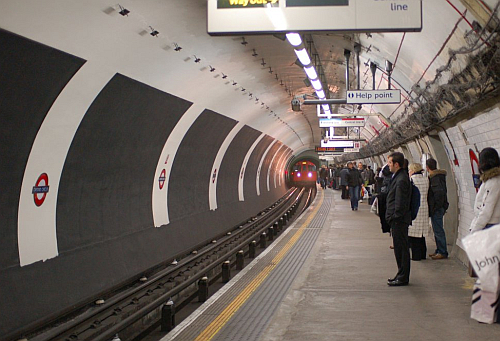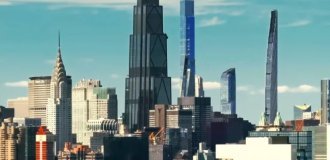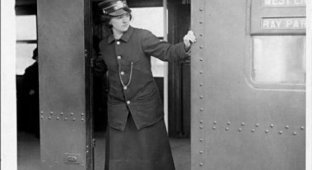Subways of cities around the world (23 photos)
1. London, England

London Underground
The London Underground is the largest and oldest in all of Europe. Its first branch was opened in 1863. Today, the London Underground carries about a billion passengers a year, and the length of its tracks exceeds 250 miles (about 410 kilometers). The London Underground also connects to various train services and transports passengers to nearby areas. Also part of the London Underground system is the driverless "Light Tube", which takes passengers across the Thames and neighboring areas, offering them spectacular views.

London Underground
Highlights: Comfortable seating, LCD displays in the station ceilings that show the number of minutes until the next train, unusual decoration of some stations and a convenient turnstile system.
2. Paris, France

Paris Metro
The Paris metro is the second oldest metro in Europe. Its discovery dates back to 1900. The Paris Metro helps the 1.365 billion people who read their favorite newspapers get where they need to go. The Paris Metro is an excellent transportation system for such a large city, with 380 stops and more than 130 miles (210 kilometers) of tracks.

Paris Metro
Highlights: Excellent coverage. In fact, any building in Paris is no more than five hundred meters from the nearest metro station. Most of the stations have been designed in a unique art style. Modest fare.
3. Moscow, Russia.

Moscow Metro
The Moscow metro is the most visited in the whole world. Every year it transports over 3.2 billion people along 12 lines, and up to 8 million passengers pass through the turnstiles of 174 stations every day. Most Moscow metro trains run underground, but sometimes they come to the surface to cross a river over a bridge or give passengers a ride near a park.

Moscow Metro
Basic moments. Incomparable architecture. At least 44 Moscow metro stations have been named architectural landmarks. A huge number of trains - during rush hours the interval between trains is only 90 seconds. In addition, this is the fastest subway in the world. Train speed reaches 90 km/h.
4. Madrid, Spain.

Madrid Metro
Madrid's underground transport system is the second largest in Europe and the sixth largest in the world. 150 miles of track have already been built, with another 30 expected to be completed later this year. In addition, the Madrid Metro is the densest underground transport network in the world.

Madrid Metro
Highlights: Very clean metro, in which an environmental cleaning system has been introduced. Fast trains and affordable prices. There is also huge progress in the development of the metro. More than 50 miles of track have been laid in the last ten years. Modern stations.
5. Tokyo, Japan.

Tokyo Subway
The Tokyo subway can rightfully be called the most intricate and technologically advanced subway in the world. It transports 2.8 billion people to 282 metro stations every year. In addition to the subway itself, the Tokyo Metro system is adjacent to the Toden Arakawa light rail line and the Ueno Zoo Monorail.

Tokyo Subway
Highlights: Absolutely clean. Trains arrive with precision down to the second and open their doors exactly opposite special marks. The seats in the carriage are heated. The names of stops are announced in two languages at once: Japanese and English. Some stations have hypermarkets and many other services for passengers.
6. Seoul, Korea

Seoul Metro
The Seoul metro is one of the busiest subways in the world. It carries up to 8 million passengers every day. It is also one of the largest in the world: about 180 miles of tracks, mostly underground, but about 30% brought to the surface.

Seoul Metro
Highlights: Beautiful architecture and incredible growth of the transport system in recent years. Convenient payment system with special prepaid cards.
7. New York, USA

New York Subway
The New York underground transport system is one of the most developed systems in the world. When it opened in October 1904, the system consisted of 28 stations. Today there are already 462 of them. Every day it transports up to 5 million people.

New York Subway
Key Points: Multiple parallel tracks allow multiple trains to run simultaneously. The New York City subway is testing a system of liquid crystal displays that will show the time until the next train arrives. 24/7 service. Excellent artistic execution of stations throughout the transport network.
8. Montreal, Canada

Montreal Metro
The Montreal metro can already be classified as a relatively new system. Its discovery occurred in 1966. It is quite small, with only 38 miles of track passing through 65 stations on four lines. Yet it is unique in its own way, and the modernist style was borrowed from the Paris Metro.

Montreal Metro
Highlights: Diverse station architecture: Each station was designed by a different architect. Pleasant and comfortable trips due to the rubber surface of the rails, which helps to avoid unpleasant sounds during the trip, and the trains themselves run frequently and are very comfortable.
9. Beijing, China

Beijing Metro
The Beijing Metro, which connects Beijing and its suburbs, is also relatively new, but with huge development plans, with approximately $8 billion earmarked for it. This dramatic development is due to the Olympic Games, which will be held here next summer. The subway development plan includes expanding the length of tracks from 71 miles to more than three hundred.

Beijing Metro
Highlights: Easy to navigate even if you are a foreigner, cheap travel. Interesting architectural finds on new lines. A very ambitious development project.
10. Hong Kong

Hong Kong Subway
The Hong Kong subway was opened in 1979 and has not had time to develop much in terms of transportation range: the length of the tracks is only 56 miles, but the subway carries up to 2.6 million people daily. And this metro system is based on its older brother from the British Isles.

Hong Kong Subway
Key Points: Efficiency. Fast service. High-tech trains. Extraordinary passenger traffic. Modern and clean trains with air conditioning. Convenient passage through turnstiles using contactless cards.
11. Sao Paulo, Brazil

Sao Paulo Metro
This underground transport system was the first in Brazil. In collaboration with the large company Companhia Paulista de Trens Metropolitanos, they laid 180 miles (about 300 km) of tracks. The Sao Paulo metro currently carries 3.7 million people daily.

Sao Paulo Metro
Highlights: The subway is known as one of the cleanest and safest systems in the world. Cheap travel.























